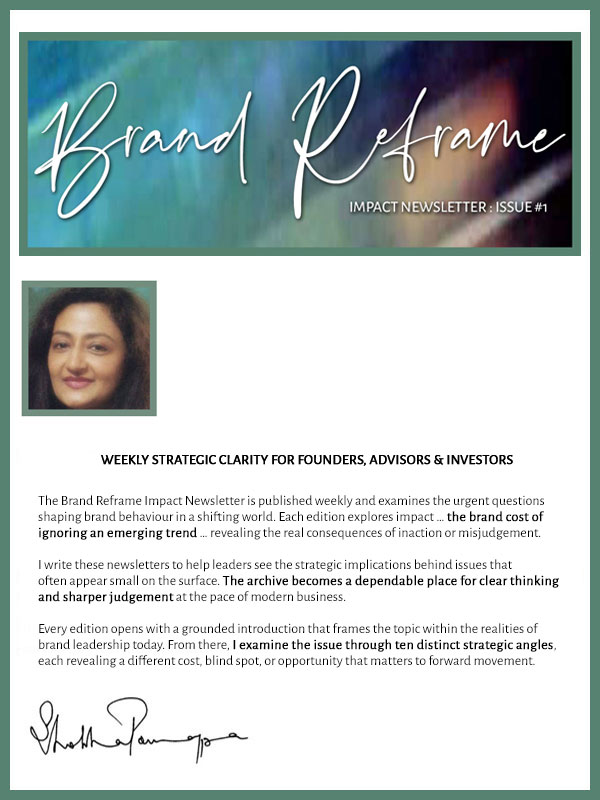
FOCUS: BRAND FOUNDER MISFIT | AUDIENCE: INVESTORS IN SLUGGISH BRANDS
BY: SHOBHA PONNAPPA | BRAND BREAKTHROUGH STRATEGIST | 45 YEARS | 125+ CLIENTS
I answer 6 tough questions about why founder-led brands often set pricing that unconsciously mirrors personal self-worth.
I often see solo or early-stage founders price emotionally rather than strategically. They fear rejection, undervalue expertise, or inflate worth to prove confidence. Pricing ends up reflecting their inner battles instead of market dynamics. This disconnect isn’t just about numbers … it’s a brand risk. In this post, I tackle six common questions about the hidden self-worth link behind pricing missteps.
One clear sign is irrational price swings. The founder may drop prices dramatically after a rejection or raise them impulsively after praise. There is little data analysis … decisions feel reactive and emotional. Another clue is when price discussions cause discomfort or defensiveness, showing a personal rather than strategic anchor.
You may also find that price positioning ignores competitor benchmarks or customer willingness to pay. Instead, it stems from what feels comfortable to the founder. When pricing shifts with their mood or confidence level, rather than research and positioning, it likely mirrors self-worth. This creates unpredictable revenue and investor anxiety.
Pricing feels deeply personal because it symbolises value and validation. Founders who equate worth with acceptance may undercharge to avoid rejection. Others may overprice as a shield to feel significant, even if the offer isn’t proven. Both traps distort market fit and slow growth.
Additionally, early praise can create false bravado while early criticism can trigger fear. Without guidance, founders translate these emotions into price moves. This turns a rational lever into a confidence barometer, confusing customers and investors alike. Emotional pricing signals a lack of strategic maturity.
Unstable pricing erodes trust and predictability. Customers hesitate to commit when prices feel arbitrary or inconsistent. Investors worry because volatile pricing undermines forecasting and valuation. Competitors can exploit this by offering clarity and confidence where your brand shows hesitation.
It also sends mixed brand signals. A high-end look with bargain pricing makes you seem unsure of quality. Overpricing without proof alienates customers and drains cash. Over time, self-worth-driven pricing creates growth ceilings that strategic models could avoid.
The first step is to recognise emotional triggers. Notice when pricing conversations feel personal or defensive. Seek external validation: market research, competitor audits, and customer interviews. Use data-driven models to anchor price tiers, not gut feelings.
A mentor, advisor, or pricing strategist can help hold space between self-esteem and numbers. This adds rigour and protects against impulsive moves. Documenting a pricing strategy playbook also gives investors confidence that decisions are market-informed. Clarity replaces doubt when value is defined beyond personal worth.
Investors should encourage structured pricing reviews. Ask for market comparisons, customer willingness-to-pay data, and unit economics. Gently surface emotional bias without shaming … founders often feel vulnerable here. Offer expert support to move pricing from gut to strategic model.
If confidence is the issue, pair the founder with a strategic co-voice or mentor who normalises premium positioning. Avoid forcing sudden jumps that could backfire. Steady, data-backed alignment builds both sustainable revenue and healthier founder psychology. This reassures markets and signals maturity.
Address it openly. Explain pricing evolution to customers, showing that it’s now anchored in market insight, not emotion. Offer loyalty gestures to early adopters if changes feel abrupt. Transparency can turn past mistakes into proof of growth and learning.
Then stabilise with clear tiered offers and rational price logic. Communicate your value proposition confidently, not apologetically. Over time, consistent, fair pricing rebuilds credibility. A brand once clouded by founder insecurity can transform into a confident market player.
If these questions sound familiar, pricing may be more about personal comfort than market reality. That gap can hold back growth, scare off investors, and confuse customers. The good news? With data-driven alignment and emotional separation, pricing can become a powerful growth lever. A single strategic pricing reset can signal maturity and unlock scale.
If you’re brand owner or manager seeking stronger brand performance, this FAQ Insight Post I wrote could interest you: “FAQs: When Your Brand Inspires but Overpromises Delivery.“
And if you’re a solo expert looking to sharpen traction, this FAQ Insight Post I worked on may resonate: “FAQs: When Brand Guidelines Don’t Match Market Realities.“

"One BIG IDEA can turn brand stagnation into unstoppable movement. Spots are limited each week ... book your breakthrough session now."
Shobha Ponnappa
More Breakthrough Ideas … Case Studies & FAQs … from the Brand Founder Misfit Category
Case Studies
FAQ Insights
Download the 14-case collection and receive weekly insights to strengthen your strategic judgement.
Get my free Case Studies Compendium. Real transformations, clear strategic shifts, and practical ways brands regain traction.

You’ll also get my fortnightly Brand Reframe newsletter. with smart insights, distilled thinking, and focused ideas to help your brand.

Just fill in the form to join. Be part of our circle thriving on brand clarity, good judgement, and several game-changing tips.